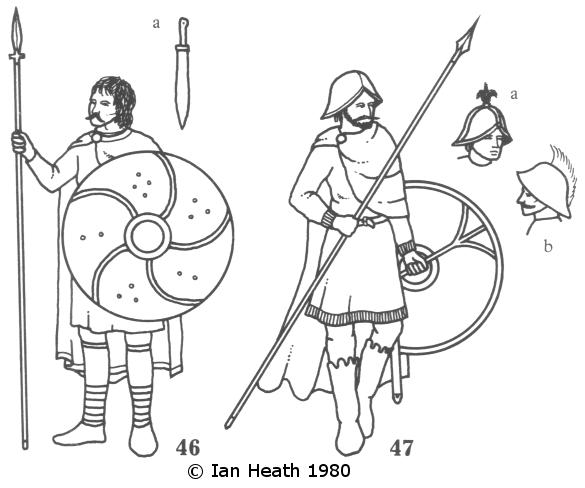8TH-10TH CENTURY CAROLINGIAN INFANTRYMEN
|
An extract from Armies of the Dark Ages 600-1066 by Ian Heath  |
|
An extract from Armies of the Dark Ages 600-1066 by Ian Heath  |
46 & 47. 8TH-10TH CENTURY CAROLINGIAN INFANTRYMEN
By the end of the 8th century the traditional costume of the Franks consisted of a long-sleeved woollen or linen tunic called a gonelle, with linen trousers, wrappings round the lower leg, which could be cross-gartered, and a long cloak reaching almost to the ankles in front and behind. Short cloaks were adopted from the Gallic population as more practical for fighting. These were often striped. There were, however, regional variations in costume; Gascons, for instance, wore a round-edged coat, puffed trousers and boots.
Tunics were predominantly white or blue. Other colours included bright red, dark red, violet, brown, ochre, yellow, grey, and sometimes green, often with contrasting hem, cuffs and collar. Purple was reserved for the nobility and royalty. Cloak colours included white, grey, sapphire blue, blue, crimson, red and brown. Leggings were most commonly scarlet.
The spear and shield were the standard arms of the general levy, though 2 or 3 javelins might be substituted for the spear. Secondary armament if carried at all would have been a knife or scramaseax, though a club or cudgel of knotted applewood was carried in addition to the spear by some. 46a shows the characteristic shape of the Frankish scramaseax, which had an average blade length of 10 inches. The winged spearhead is often mistakenly referred to as a 'Carolingian' feature though it had been in use much earlier; the function of the wings was to prevent the head from penetrating too far.
47 is better equipped, with a sword and helmet. His helmet is of a shape that is characteristically Carolingian, similar to a late Roman design from which it was probably evolved; identical warriors appear in mss. as late as 1000. 47a and b show types of crest that sometimes appear in ms. illustrations.